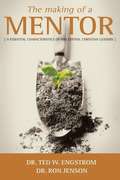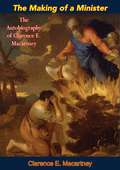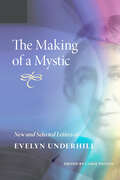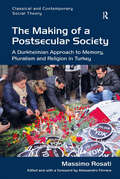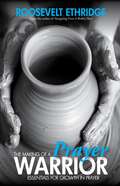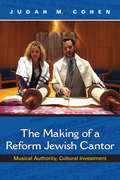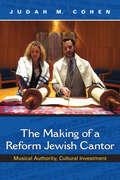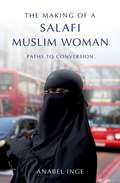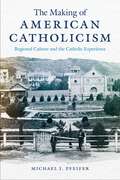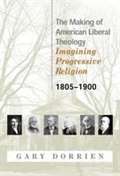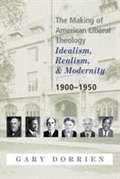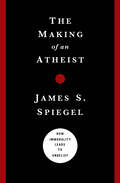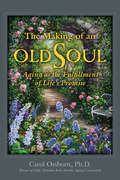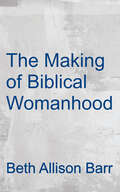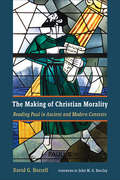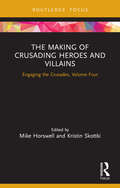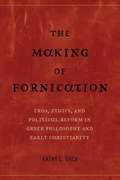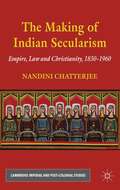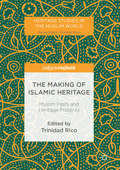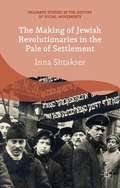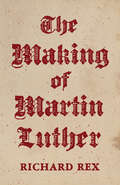- Table View
- List View
The Making of a Marriage
by Janet ThomaThis volume gives an idea of how to understand your partner, their needs and accordingly to make your marriage successful.
The Making of a Mentor: Nine Essential Characteristics of Influential Christian Leaders
by Ron Jenson Ted W. EngstromJesus ministered to many but focused on a few. What makes this strategy so compelling? Because he understood the secret of living forward—spiritual multiplication through intentionally influencing a few people at a time. He knew that by concentrating on a few faithful men and women they would leave behind them a legacy of people whose influence would extend beyond a generation or two; in fact, a legacy that would continue to multiply until he returned. This book is written to stimulate you, whatever your age, gender or position in life, toward a passionate desire to change people who will then change other people who will change other people. The key is not so much how you pour your life into people but that you are a person worth following. God placed you here to invest your life in others. This book will show you how to live and speak truth into the lives of others in a way that will transform them forever. Some of the essential leadership characteristics discussed in this book: -Self-discipline -Encouragement -Gentleness -Confrontation
The Making of a Minister: The Autobiography of Clarence E. Macartney
by Clarence MacartneyOriginally published in 1961, The Making of a Minister is Clarence E. Macartney’s autobiography—the story of a man who was a great preacher, a Civil War scholar, a skilful and prolific writer, and the leader in the evangelical movement in its time of greatest crisis….A ‘minister’s minister,’ who, personifying the highest ideals of his calling, was also and foremost a ‘folk’ minister, with the compassionate heart of a true shepherd.
The Making of a Mystic: New and Selected Letters of Evelyn Underhill
by Evelyn UnderhillEvelyn Underhill (1875-1941) achieved international fame with the publication of her book Mysticism in 1911. Continuously in print since its original publication, Mysticism remains Underhill's most famous work, but in the course of her long career she published nearly forty books, including three novels and three volumes of poetry, as well as numerous poems in periodicals. She was the religion editor for Spectator, a friend of T. S. Eliot (her influence is visible in his last masterpiece, Four Quartets), and the first woman invited to lecture on theology at Oxford University. Her interest in religion extended beyond her Anglican upbringing to embrace the world's religions and their common spirituality. In time for the centennial celebration of her classic Mysticism, this volume of Underhill's letters will enable readers and researchers to follow her as she reconciled her beliefs with her daily life. The letters reveal her personal and theological development and clarify the relationships that influenced her life and work. Hardly aloof, she enjoyed the interests, mirth, and compassion of close friendships. Drawing from collections previously unknown to scholars, The Making of a Mystic shows the range of Evelyn Underhill's mind and interests as well as the immense network of her correspondents, including Sir James Frazier and Nobel Prize laureate Rabindranath Tagore. This substantial selection of Underhill's correspondence demonstrates an exceptional scope, beginning with her earliest letters from boarding school to her mother and extending to a letter written to T. S. Eliot from what was to be her deathbed in London in 1941 as the London Blitz raged around her.
The Making of a Postsecular Society: A Durkheimian Approach to Memory, Pluralism and Religion in Turkey (Classical and Contemporary Social Theory)
by Massimo RosatiDrawing on the thought of Durkheim, this volume focuses on societal changes at the symbolic level to develop a new conceptualisation of the emergence of postsecular societies. Neo-Durkheimian categories are applied to the case of Turkey, which in recent years has shifted from a strong Republican and Kemalist view of secularism to a more Anglo-Saxon perspective. Turkish society thus constitutes an interesting case that blurs modernist distinctions between the secular and the religious and which could be described as ’postsecular’. Presenting three symbolic case studies - the enduring image of the founder of the Republic Atatürk, the contested site of Ayasofia, and the remembering and commemoration of the murdered journalist Hrant Dink - The Making of a Postsecular Society analyses the cultural relationship that the modern Republic has always had with Europe, considering the possible implications of the Turkish model of secularism for a specifically European self-understanding of modernity. Based on a rigorous construction of theoretical categories and on a close scrutiny of the common challenges confronting Europe and its Turkish neighbour long considered ’other’ with regard to the accommodation of religious difference, this book sheds light on the possibilities for Europe to find new ways of arranging the relationship between the secular and the religious. As such, it will appeal to scholars of social theory, the sociology of religion, secularisation and religious difference, and social change.
The Making of a Prayer Warrior
by Roosevelt EthridgeThe Making of a Prayer Warrior is a systematic and detailed examination into the character and the life habits needed to become a watchman on the wall for the kingdom of God. This book will guide you in looking at all social factors that influence the life of an intercessor, from gender to personality to types of prayer. Roosevelt Ethridge Jr. uses his experience and wisdom to make the trials and triumphs of a life of intense prayer into clear, actionable nuggets of truth. Learn about the power of a life of supernatural prayer—prayer that heals the sick, changes lives, sees the miracles of God come to pass. Step from simple prayers into the life of a prayer warrior.
The Making of a Reform Jewish Cantor: Musical Authority, Cultural Investment
by Judah M. CohenThe Making of a Reform Jewish Cantor provides an unprecedented look into the meaning of attaining musical authority among American Reform Jews at the turn of the twenty-first century. How do aspiring cantors adapt traditional musical forms to the practices of contemporary American congregations? What is the cantor's role in American Jewish religious life today? Judah M. Cohen follows cantorial students at the School of Sacred Music, Hebrew Union College, over the course of their training, as they prepare to become modern Jewish musical leaders. Opening a window on the practical, social, and cultural aspects of aspiring to musical authority, this book provides unusual insights into issues of musical tradition, identity, gender, community, and high and low musical culture.
The Making of a Reform Jewish Cantor: Musical Authority, Cultural Investment (A\helen B. Schwartz Book In Jewish Studies)
by Judah M. Cohen“Of interest not only to cantors and their teachers but also to rabbis, congregations and everyone concerned about the future of the Jewish community.” —Florida Jewish JournalThe Making of a Reform Jewish Cantor provides an unprecedented look into the meaning of attaining musical authority among American Reform Jews at the turn of the twenty-first century. How do aspiring cantors adapt traditional musical forms to the practices of contemporary American congregations? What is the cantor’s role in American Jewish religious life today?Judah M. Cohen follows cantorial students at the School of Sacred Music, Hebrew Union College, over the course of their training, as they prepare to become modern Jewish musical leaders. Opening a window on the practical, social, and cultural aspects of aspiring to musical authority, this book provides unusual insights into issues of musical tradition, identity, gender, community, and high and low musical culture.
The Making Of A Salafi Muslim Woman: Paths To Conversion
by Anabel IngeThis view depicts Salafi women as the hapless victims of a fanatical version of Islam. Yet in Britain, growing numbers of educated women--often converts or from less conservative Muslim backgrounds-are actively choosing to embrace Salafism's literalist beliefs and strict regulations, including heavy veiling, wifely obedience, and seclusion from non-related men.
The Making of American Catholicism: Regional Culture and the Catholic Experience
by Michael J. PfeiferTraces the development of Catholic cultures in the South, the Midwest, the West, and the Northeast, and their contribution to larger patterns of Catholicism in the United StatesMost histories of American Catholicism take a national focus, leading to a homogenization of American Catholicism that misses much of the local complexity that has marked how Catholicism developed differently in different parts of the country. Such histories often treat northeastern Catholicism, such as the Irish Catholicism of Boston, as if it reflects the full history and experience of Catholicism across the United States.The Making of American Catholicism argues that regional and transnational relationships have been central to the development of American Catholicism. The American Catholic experience has diverged significantly among regions; if we do not examine how it has taken shape in local cultures, we miss a lot. Exploring the history of Catholic cultures in New Orleans, Iowa, Wisconsin, Los Angeles, and New York City, the volume assesses the role of region in American Catholic history, carefully exploring the development of American Catholic cultures across the continental United States.Drawing on extensive archival research, The Making of American Catholicism argues that American Catholicism developed as transnational Catholics creatively adapted their devotional and ideological practices in particular American regional contexts. They emphasized notions of republicanism, individualistic capitalism, race, ethnicity, and gender, resulting in a unique form of Catholicism that dominates the United States today. The book offers close attention to race and racism in American Catholicism, including the historical experiences of African American and Latinx Catholics as well as Catholics of European descent.
The Making of American Liberal Theology: Imagining Progressive Religion 1805-1900
by Gary DorrienGary Dorrien mixes theological analysis with historical and biographical detail to present the first comprehensive interpretation of American theological liberalism. Arguing that the indigenous roots of American liberal theology existed before the rise of Darwinism, Dorrien maintains that this tradition took shape in the nineteenth century and was motivated by a desire to map a progressive "third way" between authority-based orthodoxies and atheistic rationalism.
The Making of American Liberal Theology: Idealism, Realism, and Modernity 1900-1950
by Gary DorrienGary Dorrien explores American theological liberalism in its heyday--at the advent of the research university and the institutionally identified school. <P><P>He argues that in its prime theological liberalism effected a creative blending of theological schools, featured a tension between its evangelical and modernist impulses, and was fueled by its expectation of social and cultural progress, until its optimism was subjected to withering internal criticism in the 1930s.
The Making of an Atheist: How Immorality Leads to Unbelief
by James SpiegelThe new atheists are on the warpath. They come armed with arguments to show that belief in God is absurd and dangerous. In the name of societal progress, they promote purging the world of all religious practice. And they claim that people of faith are mentally ill. Some of the new atheists openly declare their hatred for the Judeo-Christian God.Christian apologists have been quick to respond to the new atheists&’ arguments. But there is another dimension to the issue which begs to be addressed--the root causes of atheism. Where do atheists come from? How did such folks as Richard Dawkins, Sam Harris, Daniel Dennett, and Christopher Hitchens become such ardent atheists? If we are to believe them, their flight from faith resulted from a dispassionate review of the evidence. Not enough rational grounds for belief in God, they tell us. But is this the whole story?Could it be that their opposition to religious faith has more to do with passion than reason? What if, in the end, evidence has little to do with how atheists arrive at their anti-faith? That is precisely the claim in this book. Atheism is not at all a consequence of intellectual doubts. These are mere symptoms of the root cause--moral rebellion. For the atheist, the missing ingredient is not evidence but obedience.The psalmist declares, &“The fool says in his heart there is no God&” (Ps. 14:1), and in the book of Romans, Paul makes it clear that lack of evidence is not the atheist&’s problem. The Making of an Atheist confirms these biblical truths and describes the moral and psychological dynamics involved in the abandonment of faith.
The Making of an Atheist: How Immorality Leads to Unbelief
by James SpiegelThe new atheists are on the warpath. They come armed with arguments to show that belief in God is absurd and dangerous. In the name of societal progress, they promote purging the world of all religious practice. And they claim that people of faith are mentally ill. Some of the new atheists openly declare their hatred for the Judeo-Christian God.Christian apologists have been quick to respond to the new atheists&’ arguments. But there is another dimension to the issue which begs to be addressed--the root causes of atheism. Where do atheists come from? How did such folks as Richard Dawkins, Sam Harris, Daniel Dennett, and Christopher Hitchens become such ardent atheists? If we are to believe them, their flight from faith resulted from a dispassionate review of the evidence. Not enough rational grounds for belief in God, they tell us. But is this the whole story?Could it be that their opposition to religious faith has more to do with passion than reason? What if, in the end, evidence has little to do with how atheists arrive at their anti-faith? That is precisely the claim in this book. Atheism is not at all a consequence of intellectual doubts. These are mere symptoms of the root cause--moral rebellion. For the atheist, the missing ingredient is not evidence but obedience.The psalmist declares, &“The fool says in his heart there is no God&” (Ps. 14:1), and in the book of Romans, Paul makes it clear that lack of evidence is not the atheist&’s problem. The Making of an Atheist confirms these biblical truths and describes the moral and psychological dynamics involved in the abandonment of faith.
The Making of an Old Soul: Aging as the Fulfillment of Life's Promise
by Carol OrsbornThe Making of an Old Soul: Aging as the Fulfillment of Life’s Promise is the healing vision of a woman who is a scholar in the fields of adult and spiritual development as well as a lifelong seeker. Based on a mystical experience that sheds light on the entire arc of life, Orsborn’s latest work revisions age not as diminishment but as the fulfillment of life’s promise. Bursting through the stereotypes into a world of old souls, Orsborn shows you how to embrace the luminous spirit within that beats steadily beyond the wounds of childhood, beyond the unintended consequences of your best-intentions, beyond the twists and turns of fate over which even at the peak of the developmental pyramid you have no control. This gem of a book affirms that hope is merited and that seekers of all ages and circumstances have what it takes to grow not just old, but old souls.
The Making of Biblical Womanhood: How the Subjugation of Women Became Gospel Truth
by Beth Allison BarrBiblical womanhood--the belief that God designed women to be submissive wives, virtuous mothers, and joyful homemakers--pervades North American Christianity. From choices about careers to roles in local churches to relationship dynamics, this belief shapes the everyday lives of evangelical women. Yet biblical womanhood isn't biblical, says Baylor University historian Beth Allison Barr. It arose from a series of clearly definable historical moments.
The Making of Christian Morality: Reading Paul in Ancient and Modern Contexts
by David G. HorrellIn this volume David Horrell focuses on themes of community, ethics, and ecology in Paul, moving from the concrete social circumstances in which the earliest Christian communities gathered to the appropriation of Paul&’s writings in relation to modern ethical challenges. Often questioning established consensus positions, Horrell opens up new perspectives and engages with ongoing debates both in Pauline studies and in contemporary ethics.After covering historical questions about the setting of the Paul-ine communities, The Making of Christian Morality analyzes Paul-ine ethics through a detailed study of particular passages. In the third and final section Horrell brings Pauline thought to bear on contemporary issues and challenges, using the environmental crisis as a case study to demonstrate how Paul&’s ethics can be appropriated fruitfully in a world so different from Paul&’s own.
The Making of Christian Morality: Reading Paul in Ancient and Modern Contexts
by David G. Horrell John M. BarclayIn this volume David Horrell focuses on themes of community, ethics, and ecology in Paul, moving from the concrete social circumstances in which the earliest Christian communities gathered to the appropriation of Paul’s writings in relation to modern ethical challenges. Often questioning established consensus positions, Horrell opens up new perspectives and engages with ongoing debates both in Pauline studies and in contemporary ethics.After covering historical questions about the setting of the Paul-ine communities, The Making of Christian Morality analyzes Paul-ine ethics through a detailed study of particular passages. In the third and final section Horrell brings Pauline thought to bear on contemporary issues and challenges, using the environmental crisis as a case study to demonstrate how Paul’s ethics can be appropriated fruitfully in a world so different from Paul’s own.
The Making of Crusading Heroes and Villains: Engaging the Crusades, Volume Four (Engaging the Crusades)
by JONATHAN PHILLIPS; MIKE HORSWELLEngaging the Crusades is a series of volumes which offer windows into a newly emerging field of historical study: the memory and legacy of the crusades. Together these volumes examine the reasons behind the enduring resonance of the crusades and present the memory of crusading in the modern period as a productive, exciting, and much needed area of investigation. This new volume explores the ways in which significant crusading figures have been employed as heroes and villains, and by whom. Each chapter analyses a case study relating to a key historical figure including the First Crusader Tancred; ‘villains’ Reynald of Châtillon and Conrad of Montferrat; the oft-overlooked Queen Melisende of Jerusalem; the entangled memories of Richard ‘the Lionheart’ and Saladin; and the appropriation of St Louis IX by the British. Through fresh approaches, such as a new translation of the inscriptions on the wreath laid on Saladin’s tomb by Kaiser Wilhelm II, this book represents a significant cutting-edge intervention in thinking about memory, crusader medievalism, and the processes of making heroes and villains. The Making of Crusading Heroes and Villains is the perfect tool for scholars and students of the crusades, and for historians concerned with the development of reputations and memory.
The Making of Fornication: Eros, Ethics, and Political Reform in Greek Philosophy and Early Christianity
by Kathy L. GacaSexual mores and practices, and the uses of sex in the properly regulated society, according to Greek philosophical schools and to some important early Christians. Gaca shows that the Christian thinkers did not form their ideas about sex from a basis in the Greek tradition, as Foucault thought and almost everybody else thinks.
The Making of Indian Secularism: Empire, Law and Christianity, 1830–1960
by Nandini ChatterjeeA unique study of how a deeply religious country like India acquired the laws and policies of a secular state, highlighting the contradictory effects of British imperial policies, the complex role played by Indian Christians, and how this highly divided community shaped its own identity and debated that of their new nation.
The Making of Islamic Heritage: Muslim Pasts and Heritage Presents (Heritage Studies in the Muslim World)
by Trinidad RicoThis book is open access under a CC BY 4. 0 license. Offering key insights into critical debates on the construction, management and destruction of heritage in Muslim contexts, this volume considers how Islamic heritages are constructed through texts and practices which award heritage value. It examines how the monolithic representation of Islamic heritage (as a singular construct) can be enriched by the true diversity of Islamic heritages and how endangerment and vulnerability in this type of heritage construct can be re-conceptualized. Assessing these questions through an interdisciplinary lens including heritage studies, anthropology, history, conservation, religious studies and archaeology, this pivot covers global and local examples including heritage case studies from Indonesia, Egypt, Saudi Arabia, Iran, Jordan, and Pakistan.
The Making of Jewish Revolutionaries in the Pale of Settlement
by Inna ShtakserThis book examines the emotional aspects of revolutionary experience during a critical turning point in both Russian and Jewish history - the 1905 revolution. Shtakser argues that radicalization involved an emotional transformation, which enabled many young revolutionaries to develop an activist attitude towards reality.
The Making of Liturgy in the Ottonian Church
by Henry ParkesThis highly original study examines the history and religious life of the Ottonian Church through its ritual books. With forensic attention to the writing and design of four important manuscripts from the city of Mainz - a musician's troper, a priest's ritual handbook, a bishop's pontifical and a copy of the enigmatic compilation now known as the 'Romano-German Pontifical' - Henry Parkes transforms liturgical sources into eloquent witnesses to the ecclesiastical history of early medieval Germany. He also presents the first comprehensive revision of Michel Andrieu's influential 'Romano-German Pontifical' theory, from the dual perspective of Mainz's cathedral of St Martin and its Benedictine monastery of St Alban. Challenging long-held assumptions about the geographies of Ottonian power, in particular the central role of Mainz and its archbishops, the book opens up important new ways of understanding how religious ritual was organised, transmitted and perceived.
The Making of Martin Luther
by Richard RexA major new account of the most intensely creative years of Luther's careerThe Making of Martin Luther takes a provocative look at the intellectual emergence of one of the most original and influential minds of the sixteenth century. Richard Rex traces how, in a concentrated burst of creative energy in the few years surrounding his excommunication by Pope Leo X in 1521, this lecturer at an obscure German university developed a startling new interpretation of the Christian faith that brought to an end the dominance of the Catholic Church in Europe. Luther’s personal psychology and cultural context played their parts in the whirlwind of change he unleashed. But for the man himself, it was always about the ideas, the truth, and the Gospel.Focusing on the most intensely important years of Luther’s career, Rex teases out the threads of his often paradoxical and counterintuitive ideas from the tangled thickets of his writings, explaining their significance, their interconnections, and the astonishing appeal they so rapidly developed. Yet Rex also sets these ideas firmly in the context of Luther’s personal life, the cultural landscape that shaped him, and the traditions of medieval Catholic thought from which his ideas burst forth.Lucidly argued and elegantly written, The Making of Martin Luther is a splendid work of intellectual history that renders Luther’s earthshaking yet sometimes challenging ideas accessible to a new generation of readers.

